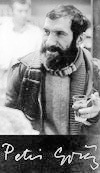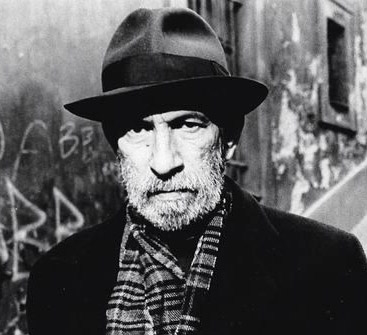Nagy Imréről (Hungarian)
Személytelen voltál, mint a többi zakós-
szemüveges vezér, nem volt érces
a hangod, mert nem tudtad, hogy mit is mondjál
hirtelenjében a sok egybegyűltnek. Épp a hírtelenje
volt szokatlan számodra. Csalódottan
hallgattalak, cvikkeres öregember,
még nem tudtam
a betonudvart, ahol az ügyész
az ítéletet, bizonyára, elhadarta,
sem a kötél durva horzsolását, a végső szégyent.
Ki mondja meg, mi lett volna mondható
arról az erkélyről. Elgéppuskázott lehetőségek
vissza nem térnek. Börtön, halál
nem köszörüli ki a pillanat élit,
ha kicsorbult. De emlékeznünk szabad
a vonakodó, sértett, tétova férfira,
akibe mégis
fölszivároghatott
düh, káprázat, országos vakremény,
mikor arra ébredt
a város: lövik szét. | Publisher | Petri György munkái I. Összegyűjtött versek, Magvető Kiadó, 2003 |
| Source of the quotation | http://dia.jadox.pim.hu |
 |
|
On Imre Nagy (English)
You were impersonal, too, like the other leaders,
bespectacled, sober-suited; your voice lacked
sonority, for you didn't know quite what to say
on the spur of the moment to the gathered multitude. This urgency
was precisely the thing you found strange. I heard you,
old man in pince-nez, and was disappointed,
not yet to know
of the concrete yard where most likely the prosecutor
rattled off the sentence, or
of the rope's rough bruising, the ultimate shame.
Who can say what you might have said
from that balcony? Butchered opportunities
never return. Neither prison nor death
can resharpen the cutting edge of the moment
once it's been chipped. What we can do, though, is remember
the hurt, reluctant, hesitant man
who nonetheless soaked up
anger, delusion
and a whole nation's blind hope,
when the town woke to gunfire
that blew it apart.
| Source of the quotation | Bloodaxe, Newcastle, 1999 |
|





